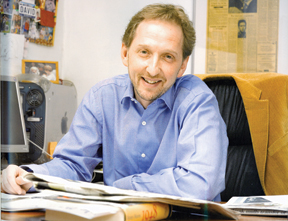 Finding the middle ground is important to David Horovitz, the founding editor of The Times of Israel, the online newspaper that started publication in February 2012. After working previously as editor-in-chief of The Jerusalem Post and the editor of The Jerusalem Report, he saw a need for a publication with a more center view of Israeli politics.
Finding the middle ground is important to David Horovitz, the founding editor of The Times of Israel, the online newspaper that started publication in February 2012. After working previously as editor-in-chief of The Jerusalem Post and the editor of The Jerusalem Report, he saw a need for a publication with a more center view of Israeli politics.
“There are publications from the left and the right,” said Horovitz in a phone interview from Israel. “When I was at Jerusalem Post I tried to keep it fair minded. But I wanted a website that was not associated with one party or another.”
“Although we have been going less than two years, I have been vindicated,” he said. The Times of Israel’s subscribers are growing.
Horovitz will bring his viewpoint of Israel and the political environment here Sunday, Nov. 17, when he speaks at the Kansas City Israel Action Forum. Sponsored by the American Israel Public Affairs Committee (AIPAC), the Forum’s keynote presentation will be on vital issues to Israel today. At the same time, he tries to give a journalism overview of life in Israel.
“I cannot be too specific because so much happens,” said Horovitz. “Things move so fast here. When I try to predict things, it is often difficult. Destabilizing events that no one thought would happen, like Morsi in Egypt and the election of Hassan Ruhani in Iran happen.”
Another destabilizing event was the cooling of the Israel/Turkey relationship. Once a strong ally of Israel, the relationship has changed dramatically over the past few years.
“(Recip Tayyip) Erdogan has been steering Turkey to a more Islamic direction. He has some basic facts and assessments wrong,” Horovitz said. “He thinks Hamas is not a terrorist group. He has a misguided view of Israel. Turkey is moving out of the European orbit and becoming more difficult. Turkey could become a powerhouse in the Middle East.
“Turkey is also involved in the Syrian conflict, which is a tragedy in and of itself,” Horovitz continued. “You have a president slaughtering his people, and the world is doing nothing. Even without the chemical weapons, he is killing. The international community is allowing this to happen. They are not stopping the evil.”
The same middle ground philosophy he uses directing the Times of Israel is the road Horovitz uses in his approach to AIPAC.
“They (AIPAC) often ask me to speak when they bring public officials to Israel,” he said. “I give them an overview on their first trip to Israel before they are pulled by political forces. I try to give the audiences current events in the Israel political scene — who is descending and who is ascending in power.”
He thinks it is most important that people realize “Israel is an astounding country with an astounding success story.”
“The achievements of reviving a land and a language in less than 150 years,” he said, is something people need to realize. “Israel solves water problems; people are awarded Noble Prizes; we do extraordinary things, but at the same times we have horrible challenges.”
These challenges are what people usually focus on.
There are people “who say they want us to make peace; they think we don’t want it,” he said. “But we do (want peace). The problems with the Palestinians and Syrians are so nuanced (and difficult). If it was obvious we would do it. We agonize because the challenges are so complicated.”
“There are issues we cannot solve by ourselves,” said Horovitz, “unless there are Palestinian leaders who will help us.”
However, he did say there are issues within Israeli society that the government can fix.
“We can fix the issues of inequality of national service,” he said. “The best and the brightest scholars should be able to study, but not the entire ultra-Orthodox community. The monopolies over life events need to be change. You cannot be born, married or die in Israel without it being in the hands of the ultra-Orthodox. Demographics have an impact on democracy. Intolerance is a problem. We need more tolerance of different streams of Judaism.”
Horovitz, who was born in Britain, also sees the challenges of the housing issue. He said the 400,000 people who took to the streets of Israel over a year ago made an impact on politicians, and people now realize that something needs to be done about the situation.
“Housing is very expensive in certain areas,” he said. “The Negev is under-populated. If we have a thriving Negev, we can provide more affordable housing.”
“The best way to understand Israel is to come,” said Horovitz. “For the first time in almost 2,000 years, we have our country back. It was too late to save the Jews of Europe. But it has been the revived homeland of the Jews. So they can flee and find a homeland and safety here.
“I will try to give people the second-hand sense of what Israel is like,” he said, “and inspire people to come to Israel and see what it is all about.”
Israel Action Forum
The AIPAC forum will be held from 1 to 3:15 p.m. Sunday, Nov. 17, at The Temple, Congregation B’nai Jehudah. Cost is $25 per person. Advance reservations are requested. To register online visit www.aipac.org/KCForum2013.



